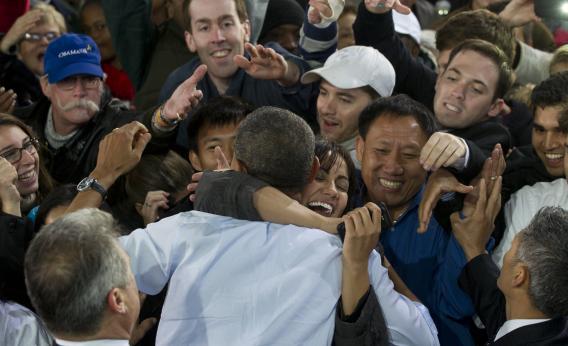Scott Lemieux, a political scientist writing for the American Prospect, published a short piece Wednesday looking at the conventional wisdom, oft spouted by pundits, that the Democrats’ embrace of women’s rights, specifically of abortion rights, has hurt them electorally more than helped them. Bouncing off Mark Smith’s analysis for Nate Silver at FiveThirtyEight, Lemieux points out that women’s rights actually helped bring about the new Democratic coalition by turning certain swing states like Washington into Democratic strongholds. Lemieux writes:
The consistent two-for-one public support for Roe v. Wade certainly puts the burden of proof on those who argue that abortion is a net loser for the Democrats in presidential politics. Moreover, contrary to the assumption of many pundits, affluent, educated voters (who are relatively more socially liberal) generally place a higher priority on social issues than working-class voters do.
So where does this belief that abortion rights hurts the Democrats come from? Well, the theory, best encapsulated by Thomas Frank’s popular book What’s the Matter with Kansas?, is that by embracing abortion rights, feminism, and gay rights, the Democrats lost the white working-class vote. This theory assumes that these voters are so concerned with reversing the progress made by women and gay people that they are willing to vote against their own economic interests. The proof seems to be in the pudding, which is the Democrats’ consistent inability to get white working-class voters behind them.
There are two problems with this theory, the first being the one that Smith laid out at FiveThirtyEight, which is that even if it were true, the fact of the matter is that prioritizing reproductive rights brought in a lot of voters for the Democrats, too. It also brought in money, as has been demonstrated in this election cycle by the heavy giving from wealthy female donors who want to see reproductive rights protected.
The other problem with that theory is that it fundamentally misunderstands the root cause of the white working-class hostility to the Democrats. While it is true that a group of Republican loyalists are driven to the polls by an obsession with abortion, many white working-class voters who are stalwart Republicans could give a whiff about abortion but get completely bent out of shape over myths about lazy people—usually imagined as people of color—getting something for nothing while they have to work for a living.
Joan Walsh recently wrote a piece for Salon analyzing the statistics on this front, gathered by the Public Religion Research Institute:
These non-college-educated whites are just about as likely as the college-educated to strongly identify with the Tea Party (13 vs. 10 percent), or to say the group shares their goals (34-31). Only one in 20 say abortion or same-sex marriage is the most important issue deciding their vote. More (50 percent) say abortion should be legal in all or most cases than illegal (45 percent). Maybe surprisingly (at least to the Catholic bishops), a solid majority (56 percent) of white working-class Catholics think abortion should be legal in all or most cases, while 53 percent of Protestants think it should be illegal in all or most cases. ….
The study finds, however, that a few of our political stereotypes are true: They are more likely than college-educated whites to say the government does too much for minorities and that discrimination against whites is as big a problem as discrimination against blacks, although, again, if you take out the South, the percentages drop. They are more likely than white college-educated voters to blame illegal immigration for their economic problems.
As Walsh notes, the study also found that conservatism amongst working class whites was most concentrated in the South. Obama performs pretty well with the white working class outside of the South, even in areas that are more religiously oriented, such as the Midwest. And the numbers Walsh reports show that the politics of resentment matter much less to younger white working-class voters, perhaps because they’re growing up in a more racially diverse country and can’t be so easily sucked in by myths of “welfare mothers” or the “food-stamp President.”
As for reproductive rights: It’s a good short-term issue for Democrats and one that will also likely pay out in the long run, bringing more college-educated voters into the fold (as it did in Washington), while the white working-class voters start to come back.
